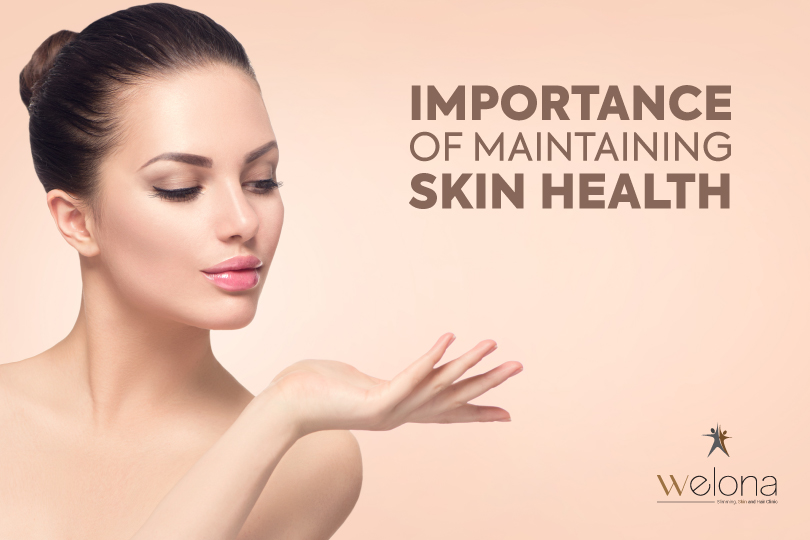The Science Of Skin Health: A Comprehensive Guide To Effective Skincare
The Science of Skin Health: A Comprehensive Guide to Effective Skincare
Related Articles: The Science of Skin Health: A Comprehensive Guide to Effective Skincare
Introduction
With great pleasure, we will explore the intriguing topic related to The Science of Skin Health: A Comprehensive Guide to Effective Skincare. Let’s weave interesting information and offer fresh perspectives to the readers.
Table of Content
The Science of Skin Health: A Comprehensive Guide to Effective Skincare

Skin is the body’s largest organ, serving as a protective barrier against the elements and a vital contributor to overall health and well-being. Maintaining healthy skin requires a multifaceted approach, encompassing proper cleansing, hydration, protection from environmental aggressors, and addressing specific skin concerns. This comprehensive guide explores the fundamental principles of effective skincare, providing insights into the science behind common skin conditions and offering practical tips for achieving a radiant and healthy complexion.
Understanding Skin Structure and Function
Skin is composed of three distinct layers:
- Epidermis: The outermost layer, responsible for protecting the body from external factors and regulating water loss. It contains keratinocytes, which produce keratin, a protein that gives skin its strength and structure.
- Dermis: The middle layer, containing collagen and elastin fibers that provide skin with its elasticity and firmness. It also houses blood vessels, nerves, hair follicles, and sweat glands.
- Hypodermis: The innermost layer, composed primarily of fat cells, which provide insulation and cushioning.
Factors Influencing Skin Health
A multitude of factors can influence skin health, including:
- Genetics: Skin type, tone, and predisposition to certain skin conditions are largely determined by genetics.
- Age: As we age, skin naturally thins and loses elasticity, contributing to wrinkles and fine lines.
- Diet: A balanced diet rich in fruits, vegetables, and antioxidants supports healthy skin function.
- Lifestyle: Smoking, excessive alcohol consumption, and lack of sleep can negatively impact skin health.
- Environmental Factors: Sun exposure, pollution, and harsh weather conditions can damage skin.
Common Skin Concerns and Their Solutions
1. Acne: A common skin condition characterized by breakouts, blackheads, and whiteheads. Acne develops when hair follicles become clogged with oil and dead skin cells.
- Treatment: Over-the-counter and prescription medications containing salicylic acid, benzoyl peroxide, or retinoids can help control acne.
2. Dry Skin: Characterized by flakiness, tightness, and itching. Dry skin can be caused by a variety of factors, including cold weather, harsh soaps, and underlying skin conditions.
- Treatment: Applying moisturizers regularly, using gentle cleansers, and avoiding harsh soaps can help alleviate dryness.
3. Oily Skin: Characterized by excessive oil production, leading to a shiny appearance and prone to breakouts. Oily skin can be influenced by genetics and hormonal fluctuations.
- Treatment: Using oil-free cleansers and moisturizers, avoiding heavy makeup, and incorporating exfoliation into the skincare routine can help manage oily skin.
4. Sensitive Skin: Characterized by redness, irritation, and a tendency to react to certain ingredients. Sensitive skin can be caused by a variety of factors, including genetics, allergies, and environmental factors.
- Treatment: Using gentle, fragrance-free products, avoiding harsh ingredients, and consulting a dermatologist for personalized recommendations are crucial for managing sensitive skin.
5. Hyperpigmentation: Characterized by dark patches or spots on the skin, often caused by sun exposure, inflammation, or hormonal changes.
- Treatment: Topical treatments containing hydroquinone, kojic acid, or azelaic acid can help lighten hyperpigmentation.
6. Wrinkles and Fine Lines: A natural part of aging, wrinkles and fine lines are caused by the breakdown of collagen and elastin fibers in the skin.
- Treatment: Topical retinoids, peptides, and hyaluronic acid can help improve the appearance of wrinkles and fine lines.
7. Rosacea: A chronic skin condition characterized by redness, flushing, and visible blood vessels on the face. Rosacea is often triggered by environmental factors, stress, and alcohol consumption.
- Treatment: Topical medications, laser therapy, and lifestyle modifications can help manage rosacea.
8. Eczema: A chronic skin condition characterized by dry, itchy, and inflamed patches of skin. Eczema can be caused by a variety of factors, including genetics, allergies, and environmental factors.
- Treatment: Topical corticosteroids, moisturizers, and anti-inflammatory medications can help manage eczema.
9. Psoriasis: A chronic skin condition characterized by thick, scaly, and itchy patches of skin. Psoriasis is caused by an overactive immune system.
- Treatment: Topical treatments, phototherapy, and systemic medications can help manage psoriasis.
10. Skin Cancer: A serious condition that develops when skin cells grow abnormally. Sun exposure is the primary risk factor for skin cancer.
- Prevention: Wearing sunscreen regularly, avoiding excessive sun exposure, and performing regular skin self-exams are essential for preventing skin cancer.
Essential Skincare Routine
A comprehensive skincare routine should include the following steps:
1. Cleansing: Removing dirt, oil, and makeup from the skin is crucial for maintaining a healthy complexion. Choose a gentle cleanser that is appropriate for your skin type.
2. Exfoliation: Exfoliating removes dead skin cells, allowing for better absorption of skincare products and preventing clogged pores. Exfoliate 1-2 times a week, depending on your skin type.
3. Toning: Toners help to balance the skin’s pH level and prepare it for moisturizer. Choose a toner that is alcohol-free and suitable for your skin type.
4. Serum: Serums are concentrated solutions that deliver specific active ingredients to the skin. Choose a serum that addresses your specific skin concerns, such as hyperpigmentation, wrinkles, or acne.
5. Moisturizer: Moisturizers help to hydrate the skin and prevent dryness. Choose a moisturizer that is appropriate for your skin type and the time of year.
6. Sunscreen: Sunscreen is essential for protecting the skin from harmful UV rays. Apply sunscreen with an SPF of 30 or higher daily, even on cloudy days.
7. Nighttime Routine: Nighttime is an ideal time for skin repair and rejuvenation. Use a heavier moisturizer or night cream to replenish the skin’s moisture levels.
Tips for Optimal Skin Health
- Hydrate: Drink plenty of water throughout the day to keep your skin hydrated from within.
- Nourish: Consume a balanced diet rich in fruits, vegetables, and antioxidants.
- Sleep: Aim for 7-8 hours of sleep each night to allow your skin to repair itself.
- Stress Management: Chronic stress can negatively impact skin health. Practice stress-reducing techniques such as exercise, yoga, or meditation.
- Avoid Smoking and Excessive Alcohol Consumption: Smoking and excessive alcohol consumption can damage the skin and contribute to premature aging.
- Protect Yourself from Sun Exposure: Wear sunscreen daily, avoid excessive sun exposure, and seek shade when possible.
- Consult a Dermatologist: If you have any concerns about your skin, consult a dermatologist for personalized advice and treatment.
FAQs
Q: What is the best way to cleanse my face?
A: The best way to cleanse your face is to use a gentle cleanser that is appropriate for your skin type. Avoid harsh soaps and hot water, which can strip the skin of its natural oils.
Q: How often should I exfoliate?
A: Exfoliate 1-2 times a week, depending on your skin type. Oily skin may benefit from exfoliating more frequently, while dry or sensitive skin may only need to exfoliate once a week.
Q: What is the difference between a serum and a moisturizer?
A: Serums are concentrated solutions that deliver specific active ingredients to the skin, while moisturizers help to hydrate the skin and prevent dryness.
Q: How can I prevent wrinkles and fine lines?
A: To prevent wrinkles and fine lines, protect your skin from sun exposure, use skincare products containing retinoids, peptides, and hyaluronic acid, and maintain a healthy lifestyle.
Q: What are the best ingredients for acne-prone skin?
A: Ingredients that are effective for acne-prone skin include salicylic acid, benzoyl peroxide, and tea tree oil.
Q: How can I reduce hyperpigmentation?
A: Topical treatments containing hydroquinone, kojic acid, or azelaic acid can help lighten hyperpigmentation.
Conclusion
Maintaining healthy skin requires a consistent and personalized approach. By understanding the science behind skin health, incorporating effective skincare practices, and addressing specific skin concerns, individuals can achieve a radiant and healthy complexion. Remember, a comprehensive skincare routine, a balanced lifestyle, and regular consultations with a dermatologist are key to achieving optimal skin health and preserving its youthful appearance.








Closure
Thus, we hope this article has provided valuable insights into The Science of Skin Health: A Comprehensive Guide to Effective Skincare. We appreciate your attention to our article. See you in our next article!
You may also like
Recent Posts
- The Art Of Persuasion: A Comprehensive Guide To Makeup Product Label Design
- A Comprehensive Look At Mary Kay Cosmetics: Reviews, Insights, And Considerations
- Affordable Skin Care: A Guide To Effective Products Under INR 100
- Navigating The World Of Mary Kay Discounted Products: A Comprehensive Guide
- The Power Of High-Resolution Images: A Guide To Acquiring The Best Visuals For Your Projects
- The Power Of Reviews: Navigating The World Of Makeup Products
- Swiss Beauty Makeup: A Comprehensive Guide To Quality And Affordability
- Embracing Natural Beauty: Makeup Tips And Techniques For Women Over 50
Leave a Reply